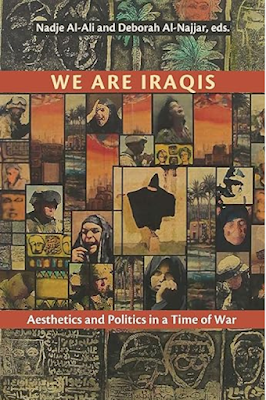Al-Ali, Nadje and Al-Najjar, Deborah, We Are Iraqis, Aesthetics and Politics in a Time of War, Syracuse: Syracuse University Press, 2013
We Are Iraqis, Aesthetics and Politics in a Time of War is about Iraqi culture and art during the U.S. occupation. It was compiled by Nadje Al-Ali and Deborah Al-Najjar. Together they wanted to create a book by and about Iraqis. Each chapter features a different writer or artist. Some are fictional stories. Some are interviews. Some are explanations of an artist’s work. Like any anthology the chapters are up and down but there’s enough good material to keep the reader interested until the end.
One of the first chapters discusses how difficult it was to create art during the U.S. occupation. First collections were looted and destroyed right after the 2003 invasion. Then the violence started and many people were displaced or fled the country. One artist for example was commissioned in 2005 to build a statue to 35 children killed in a car bombing. It was destroyed 2 months after it was revealed and then the artist had to leave Iraq because of death threats. The government also used to be the main patron of the arts and that disappeared. The two authors wanted to focus upon Iraqi culture and this piece points out just how hard it was to maintain the arts because of so much death, destruction, and disruption in society after the fall of Saddam.
Saad Jawad discussed the difficulties of maintaining higher education in Iraq after the fall of Saddam. Jawad became a professor in the 1970s. He felt like he had enough academic freedom within the confines of the Baathist regime but then things quickly turned. There was the Iran-Iraq War, then the invasion of Kuwait and sanctions which devasted professors and their teachers. Many people simply lacked the money to continue with schooling and the professors like Jawad were little better off. Jawad held out some hope that things would get better after Saddam but that didn’t happen either. The staff and students quickly turned sectarian. There was a wave of assassinations of professors. Some were killed because of their connection to the Baath but Iraq became so lawless that others were killed simply because they gave a bad grade. Militias and political parties also came to dominate many schools and decisions were made that had nothing to do with education. Things became too much and in 2006 the professor left Iraq. He was part of a brain drain from Iraq that started in the 1990s and continued into the 2000s that devasted the economy and society because many of the most skilled and educated are no longer in the country.
Dahlia Petrus provided an autobiographical piece about trying to assimilate to the Detroit suburbs of America in the 1970s. Most of the Iraqi women dyed their hair blond and tried to pass themselves off as white while there was the same pressure at school for the kids to disappear into the masses and copy everything they saw. She talks about watching the Munich Olympics when Palestinian terrorists took a group of Israeli athletes hostage. How the media covered the event paralleled how she felt in America. In both situations Arabs were made to feel like outsiders and an alien other to the American public. It was an engaging story that mirrors many other stories about immigrants to the United States.
There’s a similar article by Maki Al-Nazzal an Iraqi Jew who wrote about the difficulties of her family moving to Israel in the 1950s. The government took away her little sister and put her up for adoption and then her grandmother was told that her newborn died but was actually secretly put up for adoption as well. That was because Arab Jews were seen as backwards. Prime Minister Ben Gurion even called them savages. The idea was that the Iraqi Jewish children would be better off with a European Jewish family. Nazzal then goes through the confluence of factors from the Zionist underground to Arab nationalist parties to the creation of Israel that forced Jews to leave Iraq in the first place. That’s only the first half however as the second part is about her academic work and research into feminism.
Enough of We Are Iraqis are like these selections to make the book worthwhile. It does cover a wide variety of topics and themes so if someone doesn’t like one chapter there’s likely others that a reader can focus upon. Al-Ali and Al-Najjar also explore Iraqi culture both within the country and abroad that’s rarely discussed with almost all the focus upon the Americans and the occupation during this period. That alone makes this work standout.
Link to all of Musings On Iraq’s book reviews listed by topic





No comments:
Post a Comment